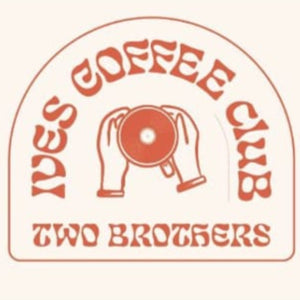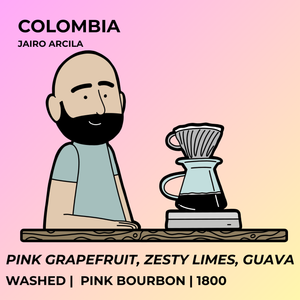Farms of Lake Atitlán coffee is mainly from a village called Pacoc which is right outside San Lucas Toliman on the way to Cerro de Oro.
Our partner Los Volcanes work with close to 100 producers in this area to which we would have to trace individual deliveries e about the traceability.
Each producer gets paid individually and each producer delivers 1 to 2 bags of cherry every day.
The slopes around the lake where the farmers are located are at high altitude, the gradient gets very steep very fast, going from 1600 up to 1900 meters in a few km.

The village of Pacoc start in front of the lake and expand on the volcano behind it.
In between the beginning and end of January, Los Volcanes organise pick up in the area combining it in the same route the coffees from San Andrés, a village on the south-facing part of the Volcano that does not look towards the Lake.
The side of the Volcano where Pacoc and San Andrés are located has great coffee growing conditions with steady rain p through the year and volcanic rich sandy soil with a lot of pumice that m it easier to work compared to the surrounding areas where the ground is a lot h composed mainly of rock and petrified lava.
Los Volcanes coffees supply organic fertiliser that g produced in house from the coffee processing by-products to all of the farmers that are in the lot, all of which live in the village of San Andrés, and Pacoc.
Currently, Los Volcanes send them 3,000 bags of compost, roughly 135 metric tons, to help in the preparation for the new harvest.
The lot is the result of the production of 32 small farms located in a valley between Volcan Atitlan and Volcán Tolimán.
The majority of these small shareholding producers live and work in the town of Patulul.
This diverse group of Kaqchikel coffee producers acquired their
land in many different ways, for the most part inheriting the land from their parents.
Between 1960 and 1996 this region was plagued with extreme violence due to the t long civil war in Guatemala.
The atrocities of this war caused distrust among people in the region, communities and even n.
For years, these farmers weren't trusting each other and to this d are still wary of outsiders.
In 2001, with the crash of the coffee market to a low of 0.41 USD per pound and the 2013 rust outbreak, farms were being abandoned and locals sought work elsewhere.
However, not all hope was lost among these producers the fact that they are having h ancient bourbon varietals scattered about the region, along with other common Caturra, Catimor, Typica, and Sarchimor varieties found in Guatemala means that these farms still c generate profits, due to the potential quality production they can harvest.
After establishing trust amongst each other, these farms began working together and the members began to organise an efficient method of compiling and sending their coffee cherries for processing and exportation.
The enthusiasm for the cultivation of coffee has b once again ignited in the area and today a lot of farmers continue to improve their cultivation methods and harvesting techniques as well as strive to improve their quality of life by being able to receive better p through the production of s coffees.

The farmers, who previously had little to no knowledge of what happened to their cherries after being sold, are now able to see the processing, roasting, and cupping of their coffees, as Los Volcanes offer them the opportunity to take part in the p process as well as taking part in workshop and classes organised by LVC.
Farmers of lake Atitlan had been selling their cherries to LVC in 2017 and in October 2018, the farmers made their first trip to Beneficio La Esperanza to see where their cherries are processed. In November 2018, members from San Andres and Pacoc as well as other farmers from the region took part in the first meeting with one of Los Volcanes’s long time foreign roasters.
This was a product that farmers nurtured from the first flowering of the coffee trees.
The product that over a year ago was well nurtured into h cherry, that was harvested, transported, processed, and sold to places the farmers had never been before, managed to bridge the gap and cancel part of the distrust that those remote isolated communities have towards anyone that is not part of their world.
The generations of hard work, embodied in the colourful w bag of coffee, had a deeper meaning to these producers than anyone on earth could understand.
Attributes:
| Cup Score | 85.75 |
| Cup Profile |
Guava, Lemon zest, Dark Chocolate |
| Altitude | 1500-1950 |
| Process | Washed |
| Varietal | Typica, Bourbon, Caturra |



